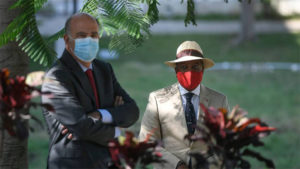 The latest high-ranking Biden administration official to visit Haiti made it clear Tuesday that the U.S. has limits on how far it will get involved in the country as it slides into anarchy amid a growing wave of gang violence that is causing gasoline and diesel shortages, shuttering schools and businesses and leading to spikes in kidnappings. “At the end of the day, it’s not going to be the international community that comes to Haiti’s rescue. It’s going to be Haitians, it’s going to be Haitian authorities and the Haitian National Police that’s responsibility for the security in the country,” said Todd Robinson, the assistant secretary of state for the Bureau of International Narcotics and Law Enforcement Affairs. Robinson, who announced a donation of armored vehicles to the police and touted the ongoing U.S. commitment to Haiti’s beleaguered police force, was repeatedly asked during a press conference by Haitian journalists about possible interventions by U.S. military troops.
The latest high-ranking Biden administration official to visit Haiti made it clear Tuesday that the U.S. has limits on how far it will get involved in the country as it slides into anarchy amid a growing wave of gang violence that is causing gasoline and diesel shortages, shuttering schools and businesses and leading to spikes in kidnappings. “At the end of the day, it’s not going to be the international community that comes to Haiti’s rescue. It’s going to be Haitians, it’s going to be Haitian authorities and the Haitian National Police that’s responsibility for the security in the country,” said Todd Robinson, the assistant secretary of state for the Bureau of International Narcotics and Law Enforcement Affairs. Robinson, who announced a donation of armored vehicles to the police and touted the ongoing U.S. commitment to Haiti’s beleaguered police force, was repeatedly asked during a press conference by Haitian journalists about possible interventions by U.S. military troops.
Journalists also wanted an update on the fate of 16 Americans and one Canadian who were kidnapped on Oct. 16, and who remain hostages more than three weeks later.
“I don’t have any information, updated information on the exercise in releasing the American citizens,” Robinson said. “What I can say is, we are working very closely with Haitian authorities; the HNP and other government officials to get the U.S. citizens and one Canadian citizen released safely and as quickly as possible.” Since Oct. 17, Haiti’s weak interim government has been unable to get tankers to deliver fuel from the country’s main distribution terminal, Varreux, located in the gang-controlled Cité Soleil neighborhood. The terminal houses about 90% of the country’s imported supplies of diesel, gasoline and kerosene. Police were able to secure some fuel from a second, smaller terminal in the Martissant neighborhood but gangs later blocked the tankers. Meanwhile, a new round of gang violence that flared up last week has all but blocked access to the Martissant terminal, even with police escorts. Despite the challenges, the government said it was able to get fuel to some pumps and hospitals, like the University Hospital of Mirebalais in central Haiti, where 60 COVID-19 patients were at risk of dying due to the lack of diesel to run generators.
The country’s recently named interim police director, Frantz Elbé, said police do have a security plan, but acknowledged that while he has seen rice and other goods coming out of Varreux, the government has not been able to get fuel. Still, the security plan has allowed for some petroleum products to be transported out, he said. “We are in a moment of crisis,” Elbé said Tuesday after a meeting of the country’s security apparatus headed by interim Prime Minister Ariel Henry. “We want to reassure the population that the police are working. The police officers are determined to help the population.” Elbé said resolving the crisis isn’t solely up to the police, but to all involved in the distribution chain because the situation is “complex.” He acknowledged that his under-equipped force, which is repeatedly outgunned by gangs and doesn’t even number 15,000 for a population of 11.5 million, is weak.
